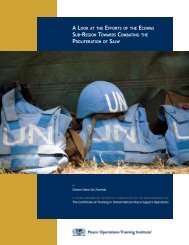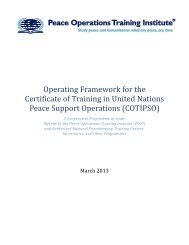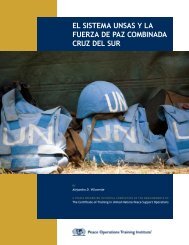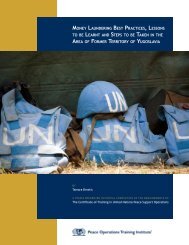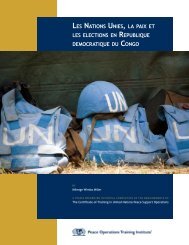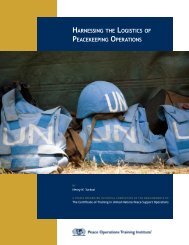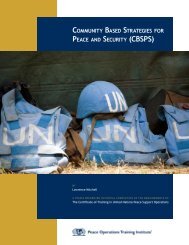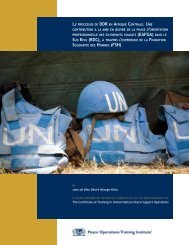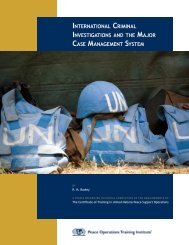the rise and rise of private military companies - Peace Operations ...
the rise and rise of private military companies - Peace Operations ...
the rise and rise of private military companies - Peace Operations ...
Create successful ePaper yourself
Turn your PDF publications into a flip-book with our unique Google optimized e-Paper software.
Hyder Gulampolis. Each actor is a beneficiary <strong>of</strong> <strong>the</strong> war economy which fuels black markets,entrenches existing economic <strong>and</strong> power relationships, <strong>and</strong> fails to address <strong>the</strong>economic, political <strong>and</strong> social problems that lie at <strong>the</strong> heart <strong>of</strong> many conflicts. There isalso <strong>the</strong> question <strong>of</strong> whe<strong>the</strong>r a country’s resources are merely being exploited to <strong>the</strong>detriment <strong>of</strong> local communities <strong>and</strong> to <strong>the</strong> benefit <strong>of</strong> international <strong>companies</strong>. Therehave been a number <strong>of</strong> cases in which a PMC has signed a contract with a governmentto provide security in resource-rich areas <strong>of</strong> a country in exchange for <strong>the</strong> mortgaging<strong>of</strong> <strong>the</strong> future revenue from natural resources by granting concessions to associatedmining <strong>and</strong> resource <strong>companies</strong>. 96The contestation <strong>of</strong> <strong>the</strong> legitimacy <strong>of</strong> a government has been precisely <strong>the</strong> reason for<strong>the</strong> PMCs presence in most cases. It should not be for PMCs to adjudicate on <strong>the</strong>legitimacy <strong>of</strong> a potential client. The reluctance <strong>of</strong> <strong>the</strong> UN to rule on <strong>the</strong> legitimacy <strong>of</strong>governments should not entitle a <strong>private</strong> entity to substitute itself for <strong>the</strong> internationalcommunity <strong>and</strong> decide whe<strong>the</strong>r its activities are lawful or not. A little over fifteenyears ago <strong>the</strong> African National Congress (ANC) <strong>of</strong> Nelson M<strong>and</strong>ela was br<strong>and</strong>ed aterrorist group by many. A key challenge in helping to prevent conflicts <strong>and</strong> buildingsustainable peace is to promote <strong>the</strong> development <strong>of</strong> accountable security forces withproper civilian oversight <strong>and</strong> control. 97In addition, when PMCs sell protective capacity to one side, it increases <strong>the</strong>(perceived) insecurity for <strong>the</strong> o<strong>the</strong>r side. This may lead <strong>the</strong> o<strong>the</strong>r side to arm <strong>and</strong>partake in a conventional arms race. The result is that <strong>the</strong> price to pay for securityincreases steadily <strong>and</strong> <strong>the</strong>re is an ever-increasing market for PMC services. 98 PMCsalso have acted as arms brokering agents for <strong>the</strong> transfer <strong>of</strong> weapons into regions <strong>of</strong>conflict. Lilly suggests that <strong>the</strong> PMCs involvement in <strong>the</strong> intricate networks <strong>and</strong>routes by which weapons enter conflict regions is not well understood <strong>and</strong> an area thatneeds fur<strong>the</strong>r research. The unregulated transfer <strong>of</strong> weapons into conflict regions canfuel violence <strong>and</strong> lead to human rights violations. 99 For example, Alex Vines hasnoted how Executive Outcomes was responsible for introducing indiscriminateweapons, including fuel air explosives into Angola. 100In modern armed conflicts, most are fought by hastily recruited militias <strong>of</strong> tribalchiefs or heads <strong>of</strong> clans, plus <strong>the</strong> armed followers <strong>of</strong> warlords <strong>and</strong> <strong>the</strong> like, <strong>and</strong> notpr<strong>of</strong>essional armies. Above all, <strong>the</strong> weapons used in <strong>the</strong>se armed conflicts are cheap<strong>and</strong> readily available, ie small arms, automatic rifles, anti-personnel mines etc. Largerweapons are rarely utilised <strong>and</strong>, consist mostly <strong>of</strong> remnants from <strong>the</strong> stockpiles <strong>of</strong> <strong>the</strong>Cold War. 101PMCs have been utilised by governments as discrete entities via with which toprosecute foreign policy. It this linkage to government that has led to <strong>the</strong> assertionthat PMCs have ‘quietly taken a central role in <strong>the</strong> exporting <strong>of</strong> security, strategy <strong>and</strong>96 Op cit, fn.7, p.20.97 ibid, p.22.98 Anna Le<strong>and</strong>er, ‘The Commodification <strong>of</strong> Violence, Private Military Companies, <strong>and</strong> African States’,Copenhagen <strong>Peace</strong> Research Institute Working Paper, 2003, athttp://www.copri.dk/publications/Wp/WP%202003/2-2003.pdf p.10.99 ibid, p.25.100 ibid, p.24.101 Herfried Munkler, ‘The wars <strong>of</strong> <strong>the</strong> 21st century’, IRRC March 2003 Vol.85 No 849, 7 at 15.Page 25The <strong>rise</strong> <strong>and</strong> <strong>rise</strong> <strong>of</strong> Private Military Companies




